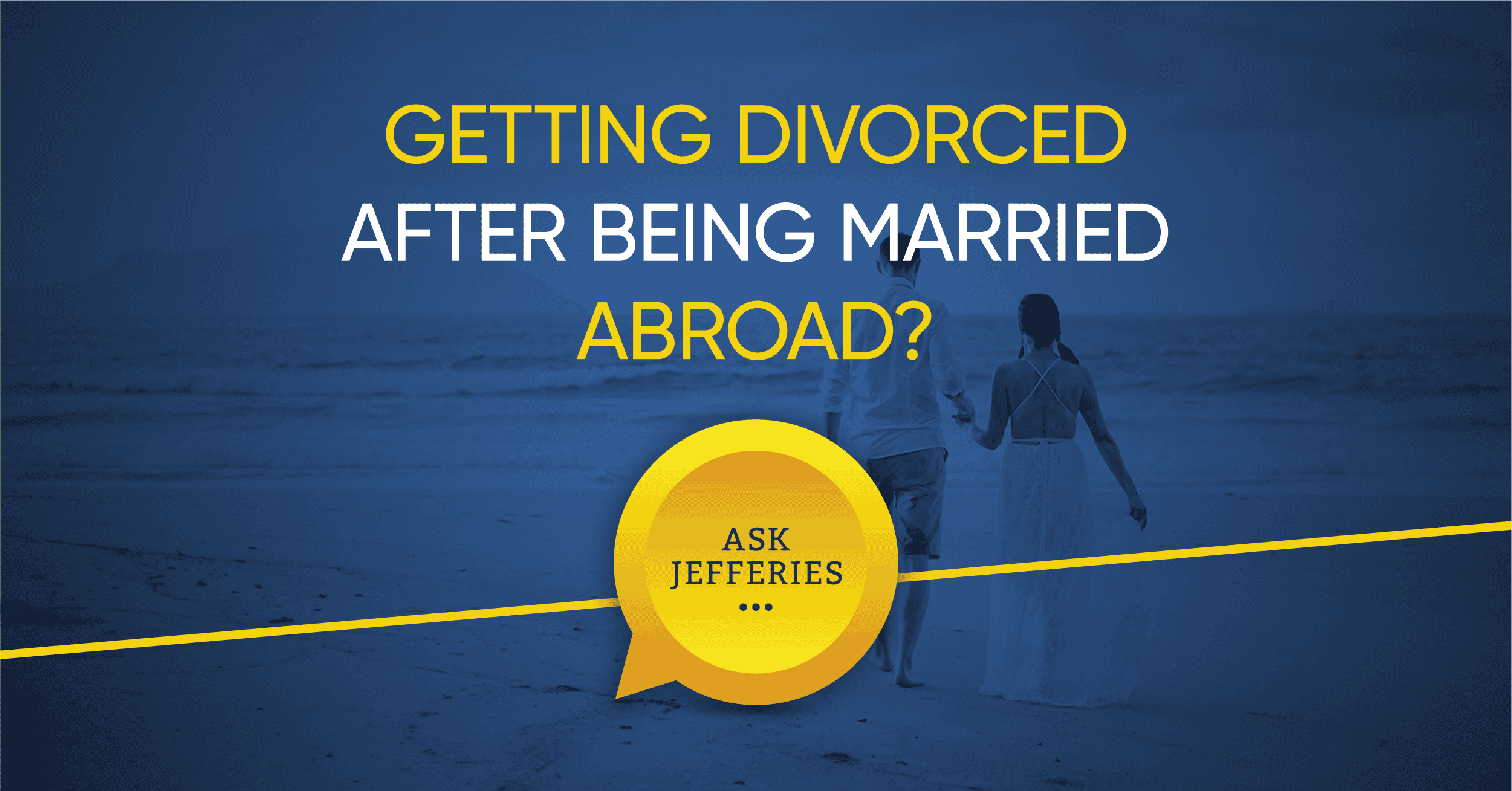Getting married or having a civil partnership abroad has become increasingly popular among British couples, with our recent poll on Facebook demonstrating most voters would opt for a marriage abroad over the UK! But with different laws in different countries, there can be some confusion when deciding to untie the knot.
Whether it’s getting married abroad or moving to the UK after the big day, many couples living in the UK have an international aspect to their relationship. In situations where those partners are considering a divorce or a dissolution, a number of questions regarding cross-border laws often emerge.
At Jefferies, our experienced Divorce law team often deal with international divorce, so we address the common questions that arise in these scenarios….
Can I get divorced or a dissolution in the UK if I was married abroad?
A divorce or dissolution does not have to take place in the same country you were married or entered a civil partnership in. So, in most circumstances, you will be able to get a divorce or dissolution in the UK even if you got married abroad. However, there are still certain criteria that you will need to meet – including your habitual status and a wedding certificate – to ensure your marriage was validated.
What do you mean by habitual status in the UK?
To get divorced or end a civil partnership in the UK, it is not an issue of where the ceremony took place, but where you are living. Either you or your spouse must be legally recognised as habitually resident or domiciled in England or Wales for a period of at least 6 months.. Regardless of nationality or where the other half lives, one of you must be legally recognised as having permanent ties to the UK for the foreseeable future. This means you can get divorced whether both of you are residents the UK, or if your partner is living abroad.
However, habitual status is mostly a legal concept which carries weight in the land of the law, so it is worth having a solicitor by your side to check you are actually in the UK. If you are unsure you meet the requirements, or need to establish your residency, contact us for more guidance.
Why do I need to provide a wedding certificate for a divorce or dissolution?
A legal divorce or dissolution cannot occur without a legal marriage or civil partnership actually taking place. So, the marriage or civil partnership must be recognised legally in both the UK and in the country that it took place for a permitted divorce or dissolution.
Issues can sometimes result from couples choosing to get married in outlandish or remote locations, or under very localised rites or laws of a particular region. This has, for example, been highlighted recently by our Divorce Law team in regards to the popular Islamic ceremony – the Nikkah wedding. While a religious ceremony may be recognised as a marriage in some cultures, it is not recognised as a civil marriage in the eyes of UK law. This can be problematic in the event of separation, when couples would like to reach a fair agreement, when it comes to the important issue of the division of the matrimonial assets.
What if I don’t have, or can’t find, my abroad marriage or civil partnership documentation?
If you do not have your original marriage or civil partnership documentation like a marriage certificate, you should contact the registrar or local authority your ceremony took place in order to obtain an official copy. It cannot be a photocopy, so make sure you get this sent by mail to your UK address.
You are not always barred from proceedings if you still can’t obtain a copy of your certificate. Our experienced Solicitors will be able to help you issue proceedings without your marriage certificate, as a last resort and will advise you of the steps you will need to take to ensure your petition is successful, without that magic ‘out of jail free card’.
If you are in this situation, send your enquiry to one of our Solicitors for more guidance on next steps.
What about the division of assets in the divorce or dissolution?
No matter which country you are married or enter a civil partnership, it is important for you to obtain proper advice about your future rights and entitlements, as it is more than likely that you will only get one shot at it. While everything may seem fair and in place, there can be hidden clauses that you may be unaware of, especially in the case of an abroad marriage.
It has been reported that some couples who get married overseas, enter into agreements which they do not completely understand, or find that their rights are different to those in the UK. For example, some countries have particular statutory property regimes that may affect your entitlements, to that of a UK marriage. At Jefferies, we really do care about what is in your best interests and work hard to achieve an outcome that it in your favour and so would not want anyone’s rights and entitlements to be affected, by the simple fact that they got married abroad.
Your divorce or dissolution abroad solicitors in Essex
The legal jargon revolved around divorce or a dissolution is like a foreign language for many, and, if you were hitched abroad, it can get even more complicated! So, it is always best to ensure you have a Solicitor by your side to ensure there is no room for misunderstandings. Get in touch with a divorce Solicitor at Jefferies to ensure the security of yourself and your loved ones.
